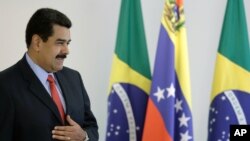Venezuelan President Nicolas Maduro's approval rating has slipped to 22 percent, the lowest of his nearly two-year rule, as a result of economic problems, a local pollster said Friday.
Maduro, 52, won election to replace his mentor, Hugo Chavez, after the latter's death from cancer in early 2013, but has seen his popularity eroded since then as the OPEC nation suffers an economic slowdown, product shortages and soaring prices.
"His popularity has gone down a lot. He's at 22 percent approval. People are waiting for solutions,'' Datanalisis director Jose Antonio Gil told local TV station Globovision.
Recession-hit Venezuela has the worst economic performance of any major nation in the region, with widespread shortages of goods from milk to car parts and 64 percent annual inflation.
The plunge in global oil prices, with Venezuela's crude worth $47 a barrel now — half of what it was five months ago — has exacerbated the scenario. Maduro blames a U.S.-inspired "economic war" by political foes, but opposition leaders say 15 years of socialism are the cause.
Gil said 60 percent of people did not believe in Maduro's argument.
"Venezuelans' main problem is shortages," he said, confirming what other polls have shown — that product scarcities have overtaken violent crime as Venezuelans' main worry.
Opinion polls in Venezuela are divergent and controversial, but Datanalisis is one of the most closely watched and respected. Gil did not say when the latest poll was taken or how many people were interviewed.
Datanalisis had put Maduro's rating at 24.5 percent in November and about 50 percent after his election in April 2013.
Facing parliamentary elections this year, Maduro has promised a six-month economic recovery plan, including reform of currency controls that are more than a decade old.
A three-tier system currently pegs the dollar to 6.3, 12 and 50 bolivars, depending on sectors, while the greenback goes for more than 170 bolivars on the black market.
Many economists recommend a devaluation or unification of rates and other measures to boost state coffers, such as a rise in gasoline prices or sale of the Citgo refining unit.
Such moves, however, could have a political cost for Maduro, as Venezuela enters 2015 with the ruling "Chavismo" movement at arguably its lowest ebb since a brief coup against Chavez in 2002.
Only 16 percent felt "identified" with the ruling Socialist Party, he said, but the divided opposition coalition was hardly doing much better, with just 19 percent.





